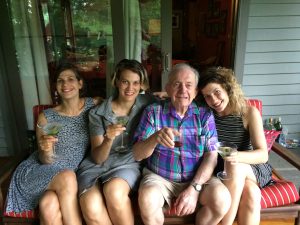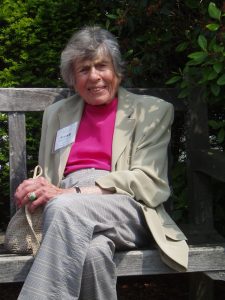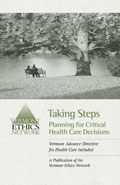
Even though I think about death almost every time I climb into a car – unquestionably the most dangerous activity in which I regularly engage – I’ve managed to put off writing my Advance Directive for Health Care for more than a decade.
It’s easy to procrastinate, especially when you’re healthy and active and think death may still be thirty or forty years off. But as I get older, I realize that simply telling my husband and children I don’t want extreme measures to keep me alive in the event of some catastrophe isn’t enough. Moreover, the older I get, the more likely the catastrophe I survive is less likely to be a car wreck and more likely to be extreme old age.
Catastrophe can’t be controlled, but procrastination can, so I’m starting the process of thinking seriously about how I want to die, even though I’m in the prime of a healthy middle age. Writing an Advance Directive for Health Care is for if/when I can’t make my own medical decisions; it will help my health care agent and medical providers know my idea of a good death.

I know first-hand how important an Advance Directive can be. Like everything else in the Technological Age, dying isn’t as simple as it used to be. And like many Baby Boomers, I’m learning this first hand from parents who have lived longer than any one else in prior generations.
For a long time, my parents enjoyed a robust retirement. (My Dad has now been retired for twenty-six years.) While my mom was alive and well, these were indeed golden years. But Mom developed vascular dementia. With my Dad’s help, she carried on for as long as she could, but the disease ultimately rendered her mute and immobile; she spent the last year of her life in a nursing home dwindling away. She was 87 when she died.

Dad just turned 91. Despite hearing loss, deteriorating vision, and what he calls “a leaky mind,” he’s engaged in writing a book, exercising, and enjoying family visits from the three generations that follow. Even so, he’s ready to go whenever he’s called, and has his Advance Directive in place. I know, because I’m his Agent.
Like my dad, I’d like to die a natural death, which is easier said than done these days; the medical-insurance-complex is geared toward keeping us alive for as long as we’re breathing, often preventing what’s called “an exit event.”
An exit event allows someone who’s sick to die simply by declining further medical treatment. For my mom, it occurred the day after her birthday, at which we’d all been present, although it’s uncertain if she knew who we were – or even that we were all there. She went into respiratory distress, and instead of being whisked off to the hospital for IV antibiotics, she was kept comfortable in her familiar surroundings and familiar caregivers while she slowly slipped away.

Now that I’ve stopped procrastinating about my own Advance Directive, I have to choose an agent and decide at what point I no longer want to live. Fortunately, I don’t have to face this somewhat daunting task alone.
Thanks to a countywide initiative, I’m receiving guidance with my Advance Care Planning from Brattleboro Area Hospice, a volunteer organization that provides programs and community support around issues connected to death, dying and grieving. BAH runs a program whose goal is making sure everyone living in Windham County has an Advance Directive for Health Care on file.

BAH gave me a pamphlet from the Vermont Ethics Network to read before my first meeting with a trained volunteer. Taking Steps: Planning for Critical Health Care Decisions is a little dry, but it’s to the point and lays the groundwork for starting The Conversation. I’d barely turned the first page before I realized I already have a pretty good idea of what I want.
I started to articulate these ideas at my first meeting. Currently, I’m thinking that I want to live as long as I can comprehend and express my appreciation for stories. But when I no longer recognize the irony of “a truth universally acknowledged that a single man in possession of a good fortune must be in want of a wife,” it’s time for me to shuffle off this mortal coil.
Before I set this down in ink, I want to benefit from Hive Mind, where those I love and will leave contribute their ideas and thoughts, so we all agree on when to stop further medical care and let nature take its course.
Since the kids are scattered around the world, I’ll be having this “conversation” by email, which suits me. And I’ve started organizing my thoughts by consulting websites like GoWish.org, where I played a card-sorting game that’s helped me clarify what I think is most important about my end-of-life care.
I’ve also visited The Conversation Project’s website, where I used their Starter Kit, answering a series of questions to further help me clarify my thoughts. At the end of the questionnaire were suggestions about how to start the conversation with loved ones. That’s next.
This conversation is critical for two reasons: First and most obviously, I want my loved ones to know what I want. My first choice of Agent is easy: my husband. But what if we’re in the same accident? It’s wise to choose an alternate – but there can be only one: One person who takes charge, acts as ombudswoman, and is the liaison between the medical system and the rest of the family.
I’m blessed with three perfectly wonderful and competent adult children, none of whom lives nearby. More to the point, asking a child to carry out one’s Advance Care Directive isn’t the same as asking her to clean up her room, so I’m hoping one of the three will volunteer. Ideally, all three will understand and feel comfortable with my litmus test for what makes life worth living.
That’s what I need to articulate, so they all know.
After ten years of procrastination, it turns out that the conversation about end-of-life care isn’t really so much about how we want to die; it’s really about clarifying how it is we want to live.
Life is good in The Middle Ages.
Have an Essay Every Wednesday emailed directly to your inbox – just subscribe. It’s easy: enter your email in the subscription box and then confirm your subscription. It’s entertaining, educational, and it’s free.
I learned some things and enjoyed your take on middle age. I remember that period. I felt like I was in the middle of a sandwich. Meat between slices of parents and children. Being an “elder” removes the top slice and that has it’s benefits. L.
Glad to know there are benefits to the next phase: The Open Face.
Thanks for reading and commenting!
Thank you for bringing up this topic, and in a safe and personal way, to encourage us all to do what we need to–completing our Advance Directive AND being sure our agent(s) are aware of our wishes and able to advocate for them. I do not want that “medical-insurance-complex” to make my decisions.
Thank you for your kind words. It’s helpful to have such affirmation when tackling such a tentative topic.
Deborah, thank you for writing such a thoughtful and thought provoking piece pointing out that an advance directive is about how we *live*.
And, I l absolutely love this line:
“But when I no longer recognize the irony of “a truth universally acknowledged that a single man in possession of a good fortune must be in want of a wife,” it’s time for me to shuffle off this mortal coil.”
Beautifully, and wittily, said!
This means a lot coming from you, Susan. Thanks. And thanks to the Brattleboro Area Hospice’s “Taking Steps Brattleboro” for getting me started on this journey.
One bit of advice: please remember to update your advanced directives every five to ten years (attorneys recommend that you do the same with other legal documents, such as wills and powers of attorney).
By the time my father needed someone to act on his healthcare proxy, he was 85 and incapacitated. By that time, my 82-year-old mother had dementia, was in denial of it, and was listed as his healthcare agent on his proxy. My incapacitated father was listed as her agent on hers!
The process to get me, the successor to the first-named agent listed in these documents, was time-consuming, complicated and involved long time delays. After that, the documents were often misinterpreted. It would have been much easier if I had been named as the healthcare agent in the document.
Please plan on your situation being different when your advanced directives need to be activated. The people you name will likely have aged as well by then, and a document written in 2006 will probably not serve you well in 2017.
Thanks for sharing this good advice, learned the hard way. In addition to reviewing these documents regularly, it’s a good idea to name alternate agents in case the first named agent isn’t available to act on your behalf. But most important is to have these difficult conversations early and often and not wait until old age and infirmity are bearing down. Talking about end of life issues at 18 (the age when you can write your own Advance Care Plan) will normalize talking about death and what you want to do in the event of a debilitating accident or illness. And what one is willing and capable of undergoing in terms of treatment at 20 is different from what most people have stamina for towards 90.
Advance care plans should be written early and updated as life and circumstances change.